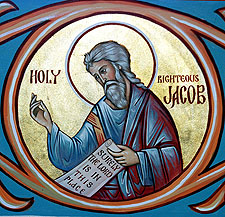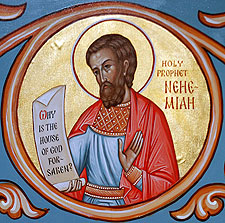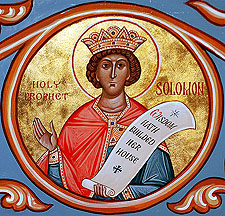Today is the Sunday of the Forefathers, commemorating Christ's ancestors. The one Troparion and Kontakion suffices for all of them.
✠✠✠✠✠
The Sunday that falls between December 11-17 is known as the Sunday of the Holy Forefathers. These are the ancestors of Christ according to the flesh, who lived before the Law and under the Law, especially the Patriarch Abraham, to whom God said, “In thy seed, shall all of the nations of the earth be blessed” (Gen. 12:3, 22:18).
Troparion — Tone 2
By faith You justified the Forefathers, / when through them You betrothed Yourself beforehand to the Church of the Gentiles. / The saints boast in glory, / that from their seed there is a glorious fruit: / she who bore You without seed. / By their prayers, O Christ God, save our souls.
Kontakion — Tone 6
(The Original Melody)
You did not worship the graven image, / O thrice-blessed youths, / but shielded by the ineffable Essence, / you were glorified in your trial by fire. / In the midst of the unbearable fire, you called upon God, crying: / "Hasten, O compassionate One. / and in Your mercy, come to our aid, / for You can do so if You will."11 Luke 5:12.
✠✠✠✠✠
The Righteous Aaron was the son of Amram and Jochebed, and the elder brother of the Prophet Moses the God-seer, and also of Miriam. He was a direct descendent of Levi by both parents. God called him “the Levite” in Exodus 4:14, when He appointed Aaron to be the spokesman for Moses, who was “slow of speech,” before the people. Later, he would also speak on behalf of Moses before Pharaoh in Egypt (Ex. 4:30; 7:2). Aaron was married to Elisheba, the daughter of the Prince of Judah (Ex. 6:23), who bore him four sons.
Moses was eighty years old and Aaron was eighty-three when they spoke to Pharaoh and asked that the Hebrews be released from their slavery. The Lord told Moses that Pharaoh would ask them for a miracle, and that Aaron should throw down his rod before him, and it would become a serpent (Ex. 7:9). When Pharaoh would not allow the Hebrews to leave Egypt, God told Moses to have Aaron stretch forth his rod over the Nile River, and it would turn to blood.
Following a succession of plagues, Pharaoh relented and let the people go, then Moses led them on their long journey to the Promised Land. In Chapter 17 of Exodus, the Hebrews fought Amalek in a battle at Rephidim. Moses stood atop a hill with the rod of God in his hand. As long as he raised his hand, the Hebrews prevailed, but when he became tired and lowered it, Amalek prevailed. Aaron and Hur sat Moses on a rock and held up his hands, one on each side. This was a prefiguration of the suffering of Christ, because the arms of Moses formed a cross. In the Greek Septuagint, the names Aaron and Hur begin with the letters Alpha and Omega, another reference to Christ (Revelation 1:8).
Aaron and his sons were anointed and sanctified to serve God as priests (Exodus chapter 29). In chapter 32, Aaron fell into temptation when Moses went up on Mount Sinai to receive the Commandments. Since Moses was taking a long time, the people grew restless and asked Aaron to make them a golden idol in the form of a calf so that they could offer sacrifices. He gave into them, and Moses was angry when he returned and saw them dancing and singing before the calf. He threw down the tablets on which God had written the Ten Commandments, and then he burned the golden calf and ground it to powder. He scattered the powder on the water, and he made the people drink it. When Moses asked those who were on the Lord’s side to gather around him, the Levites came to him. He ordered them to take their swords and slay their sons, companions, and neighbors. About three thousand people were killed that day.
Later, Aaron and Miriam criticized Moses for marrying a Cushite woman (Num. 12:1). God was angry with them, so He punished Miriam with leprosy. She was healed by God seven days after Moses interceded for her.
In chapter 17 of Numbers, the people murmured against Moses and Aaron, so God commanded that the leaders of the twelve tribes should have their names inscribed on their rods and placed in the tent of testimony. God would reveal His choice to make the people cease their grumbling against Moses and his brother. Aaron’s rod bloomed miraculously in the tent of the testimony, to show that he had been chosen for this purpose.
Aaron reposed atop Mount Hor when he was one hundred and twenty-three years old. One of his descendants was Saint Elizabeth, the mother of Saint John the Baptist (Luke 1:5).
✠✠✠✠✠
✠✠✠✠✠
Information about the holy Prophetess and Judge Deborah may be found in the Book of Judges 4:5-14, and also chapter 5.
✠✠✠✠✠
The Righteous Hezron (Esrom, or Esron) is mentioned in the Old Testament genealogies: Genesis 46:12, Ruth 4:18, and 1 Chronicles 2:9 (LXX). He was the son of Perez (Phares) and the father of Aram (or Ioram), and an ancestor of the Prophet-King David.
According to the New Testament genealogies (Matthew 1:3; Luke 3:33), Phares begat Esrom; and Esrom begat Aram.
✠✠✠✠✠
The Righteous Isaac was the second of the Old Testament Patriarchs, and the son of Abraham (Genesis 17:17-22). God tested Abraham to see if he would sacrifice his son (Genesis 22:1-13), and thus Isaac was a type of Christ. He was the husband of Rebecca (Genesis 24:67), and the father of Jacob and Esau (Genesis 25:19-26).
✠✠✠✠✠
The Righteous Jacob is mentioned in the book of Genesis, chapters 25-50. He had a dream of a ladder (Genesis 28:12-17). Angels were ascending and descending the ladder, and the Lord was above the ladder (a type of the Mother of God, who united earth to Heaven when she consented to become the mother of the Messiah). Later, Jacob wrestled with God (Genesis 32:22-30), who appeared as a man, and Jacob prevailed. Then the Lord gave him the name Israel and blessed him. Jacob called that place Peniel (The face of God), and said, "I have seen God face to face, and yet my life is preserved."
✠✠✠✠✠
Saint Miriam, like her brothers Moses and Aaron, was descended from the tribe of Levi.
When Moses was an infant, the Hebrew midwives were ordered to kill any male child when they assisted at childbirths, but they refused to obey. Moses was hidden by his mother for three months, and then, when she could no longer do this, he was placed into a basket of reeds and set upon the waters of the Nile. Miriam watched in secret to see what would happen to him. When Pharaoh’s daughter found him, Miriam emerged from her place of concealment and offered to find a wet nurse from among the Hebrew women for the baby. Miriam went to get her mother, who raised her child until he was grown, and then returned him to Pharoah’s daughter (Exodus 2:10).
In the Torah, she is called “Miriam the Prophetess” (Exodus 15:20), while the Prophet Michah (6:4) has God say that He sent Moses, and Aaron, and Miriam before the Hebrews to lead them out of Egypt.
In Chapter 12 of the book of Numbers, Miriam and Aaron apparently criticize Moses for being married to a foreign woman of Cush (or an Ethiopian). This, however, was merely a pretext for their resentment. Actually, they were disturbed by Moses’ position as the sole mediator between God and the people. Miriam was a prophetess, after all. Miriam and Aaron questioned Moses, “Has the Lord spoken only to Moses? Has He not also spoken to us?” God then tells them that He speaks face to face with Moses, but only in visions to Miriam and Aaron while they are asleep. Then, for daring to speak against Moses, Miriam is punished with leprosy. Aaron pleads with Moses not to hold their sin against them, since they had acted out of ignorance. Even so, Miriam was set apart outside the camp for seven days, and then she was healed and allowed to come in.
In one of the stichera on the Praises for the Sunday before the Nativity, Sarah, Rebecca, Anna, and Miriam, “the glory of women,” are said to “exchange glad tidings.”
✠✠✠✠✠
The Prophet Nathan was an advisor to King David and King Solomon. He is mentioned in the Prayer of Absolution in the Mystery of Confession: “It was God Who pardoned David through the Prophet Nathan when he had confessed his sin....” David had committed adultery with Uriah's wife Bathsheba, and had him killed. Then he took Bathsheba as his wife. David confessed his sin to Nathan (2 Samuel 12:13) and received pardon.
✠✠✠✠✠
The Old Testament book of Nehemias tells of how he returned from the Captivity in Babylon in the twentieth year of the Persian King Artaxerxes (445/444 B.C.) to rebuild Jerusalem and to govern the province. He and Esdras purified the Jewish people by making known the Law of Moses, and forcing the men to divorce their pagan wives.
✠✠✠✠✠
Seeing the wicked deeds of men, God decided to destroy man from the earth, and even cattle, reptiles, and birds. But Noah found favor with the Lord, Who spared him, his sons and their wives. Therefore, God commanded Noah to build an ark and take two pairs of every creature into it. Then it rained for forty days and nights, and men and animals perished in the flood. The water remained on the earth for 150 days, then God blessed Noah and his sons, telling them to increase and multiply (Genesis 9:7).
Through Noah's sons Shem, Ham and Japheth, the earth was repopulated, and God promised not to destroy the world by water again. Noah reposed at the age of 950 (Genesis 9:29). The ark is a figure of the Church, which is called the Ark of Salvation.
While speaking about the end of the world, the Savior told His disciples: "As were the days of Noah, so will be the coming of the Son of man. For as in those days before the flood they were eating and drinking, marrying and giving in marriage, until the day when Noah entered the ark, and they did not know until the flood came and swept them all away, so will be the coming of the Son of man" (Matthew 24:37-39).
✠✠✠✠✠
Rebecca was the wife of the Old Testament Patriarch Isaac, and the mother of Jacob and Esau. She is mentioned in Genesis 22:23; Chapters 24-28; and Chapter 49:31. Saint Paul also mentions her (Romans 9:10).
✠✠✠✠✠
Sarah was the wife of the Old Testament Patriarch Abraham and the mother of Isaac. At first she was called Sarai, and her name was changed to Sarah (Genesis 17:15-16). The three men who visited Abraham at the oak of Mamre told her that she would conceive and have a son (Genesis 18:10). She did not believe them at first, since she and her husband were old, but they insisted that she would bear a son in the spring. Their prediction was fulfilled, and God did as He had promised (Genesis 21:1-3). Saint Andrew Rublev depicts the three men as angels in his most famous icon. Sarah is praised in the New Testament for her faith (Hebrews 11:11) and also for her obedience (I Peter 3:6).
✠✠✠✠✠
The Prophet-King Solomon (ca. 972 - 932 B.C.) was the son of David and Bathsheba. He succeeded his father as King and reigned for forty years. He built the palace and the Temple at Jerusalem, and was renowned for his wisdom. The Old Testament books of Proverbs, the Song of Songs, and the Wisdom of Solomon are attributed to him. He may have written parts of these books, but much of the material was probably transmitted orally before it was written down.
In the Gospels, Christ mentions Solomon by name, citing his glory and wisdom (Matthew 6:29; 12:42).
✠✠✠✠✠
The 64-verse story of Susanna is found in the Septuagint Greek as a Preamble to the Book of Daniel. The Latin Vulgate, however, places the story of Susanna at the end of the Book of Daniel, which constitutes the book's thirteenth chapter.
✠✠✠✠✠
Information about the Righteous Ruth, the wife of Boaz, may be found in the Old Testament book bearing her name.
✠✠✠✠✠
(No Icon Available)
Saint Mary is the mother of Saint Anna, and the grandmother of the Theotokos
















No comments:
Post a Comment
Comments are subject to deletion if they are not germane. I have no problem with a bit of colourful language, but blasphemy or depraved profanity will not be allowed. Attacks on the Catholic Faith will not be tolerated. Comments will be deleted that are republican (Yanks! Note the lower case 'r'!), attacks on the legitimacy of Pope Leo XIV as the Vicar of Christ, the legitimacy of the House of Windsor or of the claims of the Elder Line of the House of France, or attacks on the legitimacy of any of the currently ruling Houses of Europe.